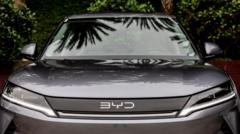A recent investigation revealed over 160 workers subjected to extreme living conditions, resulting in the suspension of the factory's development in Bahia.
**Brazil Halts BYD Factory Construction Amid 'Slavery-like' Conditions**

**Brazil Halts BYD Factory Construction Amid 'Slavery-like' Conditions**
Brazilian authorities have intervened in the construction of a BYD factory, uncovering harsh working conditions for employees.
The Brazilian Government has taken significant measures against a construction site for BYD, the Chinese electric vehicle (EV) manufacturer, due to its treatment of workers termed as comparable to "slavery." The Public Labour Prosecutor's Office (MPT) reported that more than 160 workers were rescued from deplorable conditions in the northeastern state of Bahia. The allegations state that these workers, employed by Jinjiang Construction Brazil, experienced a "degrading" environment, with reports highlighting the withholding of passports and salaries.
In response to the situation, BYD has severed ties with the involved construction company and reaffirmed its commitment to comply fully with Brazilian labor laws. This factory was initially set to be operational by March 2025 and was BYD’s first intended electric vehicle manufacturing site outside of Asia.
The workers, residing in Camaçari city, were reported to be subjected to unhealthy living conditions, including sleeping on beds void of mattresses and sharing bathrooms among 31 individuals. The MPT has termed these conditions as revealing a "dramatic picture of depravity and neglect." According to Brazilian law, "slavery-like conditions" can include debt bondage and violations of human dignity, which at this site appeared prevalent. The MPT confirmed that the scenario potentially constituted "forced labor" as many workers faced withheld wages and exorbitant costs if they wished to end their contracts.
BYD has since relocated the affected employees to hotels and has claimed that it had attempted multiple times to have the construction firm rectify the troubling conditions. Notably, BYD, an acronym for Build Your Dreams, has rapidly ascended to become one of the world’s top electric vehicle producers, overtaking Tesla in total sales during the last quarter of 2023. The company has been expanding its operations in Brazil—its largest international market—initially launching a factory in São Paulo in 2015 to produce chassis for electric buses, before announcing significant investments for further manufacturing capabilities in the country.
As backlash against Chinese automotive practices continues globally, Brazil finds itself at a crucial crossroads, balancing foreign investment and labor rights amidst international scrutiny.
In response to the situation, BYD has severed ties with the involved construction company and reaffirmed its commitment to comply fully with Brazilian labor laws. This factory was initially set to be operational by March 2025 and was BYD’s first intended electric vehicle manufacturing site outside of Asia.
The workers, residing in Camaçari city, were reported to be subjected to unhealthy living conditions, including sleeping on beds void of mattresses and sharing bathrooms among 31 individuals. The MPT has termed these conditions as revealing a "dramatic picture of depravity and neglect." According to Brazilian law, "slavery-like conditions" can include debt bondage and violations of human dignity, which at this site appeared prevalent. The MPT confirmed that the scenario potentially constituted "forced labor" as many workers faced withheld wages and exorbitant costs if they wished to end their contracts.
BYD has since relocated the affected employees to hotels and has claimed that it had attempted multiple times to have the construction firm rectify the troubling conditions. Notably, BYD, an acronym for Build Your Dreams, has rapidly ascended to become one of the world’s top electric vehicle producers, overtaking Tesla in total sales during the last quarter of 2023. The company has been expanding its operations in Brazil—its largest international market—initially launching a factory in São Paulo in 2015 to produce chassis for electric buses, before announcing significant investments for further manufacturing capabilities in the country.
As backlash against Chinese automotive practices continues globally, Brazil finds itself at a crucial crossroads, balancing foreign investment and labor rights amidst international scrutiny.



















